- Home
- Gary Corby
The Singer from Memphis Page 11
The Singer from Memphis Read online
Page 11
“Good morning,” he said politely. He handed me a sheet of papyrus.
“What’s this?” I asked.
“I don’t know, I’m just the messenger.”
“A message? You people send messages written on paper?” I said, aghast. “Isn’t that expensive?”
“Not in Egypt.”
He turned around and walked back the way he’d come.
“What does it say, Nico?” Diotima asked.
I turned the papyrus one way, then the other, trying to make sense of it. “I don’t know. It’s covered in weird squiggles.”
“Allow me,” Max took the paper from my hands. He turned it the other way round, and read. As he did, his eyebrows rose higher and higher.
“I congratulate you, Nicolaos,” Max said, when he was done. He handed back the papyrus sheet.
“Oh?” I asked.
“This missive is from the Department of Public Health and Safety. You have been officially declared a plague carrier.”
“What!”
“You are officially and formally warned off from sleeping in any public hostel, inn, tavern or other place of rest,” Max said with a straight face.
“What plague does my husband carry?” Diotima said. “I ask only in case I should fear for my own health.”
“Bedbugs,” Maxyates said. “I regret to inform you, madam, that your husband is overrun with bedbugs. The document goes on to say that copies of this warning have been sent to every hostel in Memphis. In triplicate, of course.”
I recalled the Tjaty’s words, that public servants were sadists who liked to toy with their prey before they destroyed them. I should have listened to him.
That brought to mind the landlord’s fear of bad luck and curses. There was no way he was going to let me through the door after he saw a message like this.
“Where am I supposed to sleep?” I asked.
“In the street?” Max said.
“I’m sure the beggars could suggest something,” Djanet added.
At that moment the beggar with two legs returned. He asked us to follow him.
The Blind General
The beggar led us from sunny streets to a district of dark lanes, somewhere far from the river. At that place our guide turned to a deserted warehouse, where the door hung off its hinges. He pushed his way through—the door squeaked noisily—and we found ourselves in a large, empty space. The roof above had half rotted away. In this derelict building, under a small, poorly rigged awning, sat an old man and a young girl. Scattered around them were the things of a camp: a couple of bedrolls, some stale bread and cheese, a flask of beer and an oil lamp.
The Blind General was a thin man, and old. He was half-shaven. You couldn’t call the face hair he wore a beard, more like a three-day growth that was gray enough to be almost invisible against his leathery skin. He seemed as ancient as the Gods, but as hale as you can be when you’re dressed in rags and living off scraps.
The girl sat beside the man. I guessed her age for eight. She wore a dress and looked far better fed than he. As we approached, she whispered into his ear.
“Greetings, Djanet,” he said. “What do you bring me?”
He looked up at us with eyes that were . . . I almost gasped. Herodotus did gasp. Diotima strangled a sob.
Whatever had destroyed the General’s eyes, it had been hot, and it had seared the flesh, so that the sockets were scarred, empty holes. The skin about was scarred and pitted too. If someone had told me had this was not a man but some creature from the depths of Tartarus, well, I would have believed it.
“Greetings, General,” Djanet said. Her voice was solemn. “I bring you querents.”
The General harrumphed. “Querents? Then you have come to the wrong place. I am no oracle like the one at Siwa, to dispense wisdom.”
“You are better than an oracle, General. Every beggar in Memphis has benefited from your wisdom,” Djanet said.
“Hmmph,” he said, clearly unimpressed. “What wisdom do these querents seek from an old beggar?”
I said, “General, sir, my name is Nicolaos, from Athens. We wish to learn of the last days of your Pharaoh Psamtik.”
He turned to look straight at me as I spoke. It was disconcerting.
“I never speak of those days. Why should I?”
“It would help us,” was all I could offer lamely.
“Do you give alms to beggars?” he asked abruptly.
“Er . . .” I thought about the coin collector in Naukratis, but I was fairly sure he didn’t count.
The beggar who had led us here spoke up. “The Athenian lady gave me a handful of coins, General.”
“She did, did she?” His head turned to look at Diotima. “That would be the pretty lady with the dark hair, who stands silent between the two Hellene men?”
The girl-child was still whispering non-stop into his ear. Now I realized why.
The General said in approval, “Since you gave alms to the poor, I will speak with you.”
“Thank you, sir,” said Diotima. “It is as my husband says. We seek the crook and flail of the last Pharaoh.”
“In the name of Ra, why?”
“A deal has been struck,” Djanet said. “If Inaros can prove his descent, then the bureaucrats in Memphis will acknowledge him Pharaoh.”
“Inaros? He’s a bloody Libyan,” the General said.
Maxyates stirred, but showed remarkable restraint.
“Nobody’s perfect, General,” Djanet said. “At least Inaros wins battles, and he wants to expel the Persians.”
“To remove the Persians from Egypt?” he said dubiously.
“To send them across the desert with such a defeat that they never return,” Djanet said sincerely.
“Then I am your man.” The General sat up straighter. “Though everything I tell you will be to my discredit.”
This was excellent news.
I said, “Good, then please tell us—where can we find the crook and flail?”
“I have no idea.”
This was bad news.
“But I was there when the crook and flail were lost,” he said to us. Then he sighed. “I was there for the entire disaster.”
“It must be quite a tale,” Herodotus said.
“Only if you enjoy disaster stories.”
“But I do, General,” Herodotus said smoothly. Extracting stories from people was Herodotus’s specialty. He took over. “Tell us what happened, so that we can learn from the past. That’s a worthy goal, is it not?”
“Hmmpf,” the General grunted again. It seemed to be his favorite response. He thought for a moment, then said, “Pharaoh was new in the job. He’d only just inherited from his father, Ahmose, who had ruled for forty-four years. Psamtik was not the man his father was.”
“What sort of man was he?” Herodotus asked.
“Hatred was his daily bread, and he fed well upon it.”
“Oh.”
The Blind General shrugged. “It was . . . difficult. Pharaoh would strike us when he was displeased, for the slightest reason. Even we military men of the highest rank. I once saw him strike my predecessor across the face with the sacred flail. My predecessor turned against Psamtik because of that.”
“Were you really a General?” I said, astonished.
“Of course I was a General, you dolt! If I had been a Lieutenant then I would be the Blind Lieutenant.”
“I mean, I had thought it a courtesy title.”
“Not at all. King of the Beggars is a courtesy title. They call me so because I have the most experience. I’ve been begging for sixty-eight years now. But I was a true General.” He sighed. “I was a young man in those days, and tall, and straight of limb. I commanded my first division at twenty-two years.”
“That’s a very young age to be a General,
” Herodotus said.
The General nodded. “You are right, yet it was a natural appointment. I will say, without false modesty, that I was the finest warrior in Pharaoh’s army, and my father was among the highest noblemen in the land. I will not tell you my sire’s name, I do not wish to sully his memory by any connection with me. But know that my forefathers had served Pharaoh since the Black Land became one nation. Thus as soon as I was blooded in battle, Pharaoh appointed me commander of the Division of Ra, we of the many-weapons.”
“Many weapons?” Herodotus asked. He wrote notes as he spoke.
“My men could fight with anything,” he said proudly. “We carried spears, bows, slingshots, daggers, swords of good bronze. You name it, and we could kill you with it. We were . . .” He paused. “I don’t know the word in your language.”
“Like the Immortals of the Persians?” I suggested. “Top line troops?”
He nodded. “Just so. I vowed never to fail Pharaoh, nor did I. I brought him victory in all my assignments.” His shoulders slumped. “That is, until the final onslaught.”
“The battle against the Persians?”
“Yes. My predecessor was a mercenary, Phanes of Halicarnassus by name. In revenge for the shameful blow Pharaoh had struck across his face, Phanes sought out King Cambyses of Persia. He showed the Persians how Egypt could be attacked.”
Herodotus had stopped writing. “The Phanes you speak of led the Persians into Egypt?”
“When our armies met upon the sands, Phanes stood beside Cambyses. Psamtik saw this and shook his flail at Phanes, the very same one with which he had struck Phanes in the first place.”
“So we have the flail at the battle,” Herodotus muttered. He made a note.
“There is something you must understand, if you wish to find the crook and flail . . .” The Blind General drew a deep breath before continuing. “Psamtik ordered the sons of Phanes brought with us to the battlefield. I didn’t understand why until, right before the fighting began, he ordered the two boys brought forward. Psamtik cut their throats before our eyes. Before the eyes of their father, too. Phanes stood on the other side of the field and saw his sons die. Then he watched while Egyptians drank the blood of his boys. Pharaoh was the first. He drank from a cup.”
“Are you serious?” I exclaimed. I had never heard of such barbarity. Not even from uncivilized savages.
“I told you that hatred was his bread.”
“I can’t believe it.”
“It shames me to admit it,” said the General, “But I didn’t object. I think Psamtik had gone mad. If I had tried to stop him, I might have shared the fate of the children.”
“How did Phanes react?” I asked. I couldn’t imagine what I would do if I had sons.
“During the battle he slaughtered every Egyptian within reach.”
“Understandable.”
“It gets worse. After we had been routed, Cambyses sent an ambassador, by boat, to Memphis, to ask us to surrender on terms. The Persian ambassador had barely finished speaking before Psamtik had him torn limb from limb. Then he ordered the crew of the boat that had brought the ambassador dealt with the same way.”
“I’m beginning to see why the Persians aren’t so keen on Egyptians,” I said.
“They got their revenge,” said the General. “After we had been defeated, they selected two thousand youths from our best families and executed every one of them, starting with Pharaoh’s own son. Then they enslaved the maiden daughters of our noblemen, including Pharaoh’s daughter. I shudder to think where most of them went.”
“Is that when they exacted their revenge upon you too, General?” Herodotus asked quietly.
“They held me down while one of their men pressed hot blacksmith’s irons into my face,” he said dispassionately. “I thought I would die. But I lived, as they intended. Then they released me onto the street, to be a blind beggar for the rest of my life.”
It was an ugly story, with terrible atrocities. There’d been no side in this war worthy of my sympathy. I wondered if we should continue with the assignment. Then I thought of Inaros, the only man who would suffer if we gave up. He seemed a good man, and a better ruler than anyone else on offer.
“They didn’t hurt Psamtik,” the General said. “Not then, anyway. He was kept alive at the Great King’s court here in Memphis, for many months, until he caused more trouble and they killed him. But long before that, Cambyses was wearing the Double Crown.”
My heart fell. “What if the Great King also has the crook and flail?”
“I don’t think that’s likely,” said Djanet. “He has the Double Crown for sure. The Persians made a big thing of it. Cambyses wore the crown during a parade through Memphis. When he departed, he took it with him. I doubt the crown will ever return to Egypt. But Cambyses did not carry the crook and flail. I’m sure he would have, if he’d had them.”
“Djanet is correct,” said the General. “I was invited by the Pharaoh to join him in his prison, when he learned of my plight. It was a sumptuous prison and information got in and out with ease. If Cambyses had found the crook and flail, I would know it.”
“Then some time between the battle and the final defeat, the crook and flail disappeared,” Herodotus said.
“Yes.”
“Maybe Psamtik destroyed them?”
“No,” said the General and Djanet simultaneously.
“You don’t know how it is for us Egyptians,” Djanet explained to our surprised Hellene silence. “The crown is the kingship. But the crook and flail are Egypt. No true Egyptian could harm them.”
“Hidden then,” Herodotus said. “Or spirited away.”
“Yes.”
“I wonder how he managed that?” Herodotus asked.
“Did he have the crook and flail then?” I asked.
The General laughed. “Do you think he would tell me? Besides, I spent that year in fever and agony. Nobody could trust me with anything.”
“Oh, of course, excuse me,” I said.
“But rest assured, if Psamtik had displayed the insignia while he was a prisoner, they would have been taken from him,” the General said.
“Then he hid them while he was there,” Herodotus said.
“Or he gave them away,” Diotima suggested.
Cheery optimism was lacking across the party.
Into the depressed silence the General said, “That’s all I can tell you.”
“Thank you, General,” Diotima said. “May I ask, who is this girl with you? Is she your granddaughter?”
The General laughed, an oddly harsh sound. “You are absurd. I may be blind, but I know what I look like. I would never have imposed myself on a woman. No, the girl is an orphan. She has my protection, which is valuable. A small girl on the street is . . . vulnerable.”
“I understand,” Diotima said.
“With me she has food, a dress to wear, a place to sleep. In return she tells me what she sees. Little Tia here”—he patted her on the head; the girl looked solemn—“she is one of a long line. When she is old enough to make her way in the world she will leave, and I will take in another orphan.” He sighed. “There’s always another orphan.”
“You are kind.”
“It’s a fair arrangement,” he said gruffly. He hesitated, then said, “Your question puts me in mind of someone who might be able to help you. Let me make enquiries. One of the beggars will contact you tomorrow.”
As we left, I asked Djanet the obvious question. “How do you come to know the General?”
“I know all sorts,” Djanet said, off-hand. “In the case of the General, it’s easily explained. The line between an artist and a beggar is finer than most artists would like.”
“What’s his real name?”
“Nobody remembers,” Djanet said. “He’s been the Blind General since before any of us
were born.”
Knowing now that he had been a nobleman and a genuine commander, I was fairly sure that his true name could be discovered if we wanted, but the poor man deserved his anonymity. I said, “I wish we could do something for him.”
“Don’t be ridiculous,” Djanet said. “Don’t you think he could rise from poverty if he wanted? He does this deliberately, to punish himself for losing the fight against the Persians.”
The Arrow
I slept in the street. The innkeeper refused to let me through his door, let alone near his beds, not with an official public service notice in his hand that said I was crawling with bedbugs. Diotima had insisted on joining me outside, and I had insisted she sleep in our rented room. I eventually prevailed because, beneath that headstrong exterior, my wife is at core a sensible woman.
So Diotima retired to our comfortable bed, and the beggars showed me a good place outside, under a tree in a secluded courtyard, off a lane from the main road. I’d slept in worse places, but that was when I’d been doing my time as a recruit in the army. It had been some years since I’d slept rough. Married life has that effect on a man. I discovered I’d lost the art of sleeping in the soft dirt.
Not that the dirt was soft. It was more like gritty sand on hard rock. Nor was there even a single blade of grass anywhere within the city to be my cushion. Egypt is that kind of place. (The beggars had gleefully told me that out on the farms, sleeping under the stars was considered very pleasant as long as the crocodiles don’t get you.)
I tossed and turned, unable to get comfortable. No matter how I lay, there was some part of my anatomy digging into the sandstone. Eventually I turned onto my stomach, which was good enough to send me into a doze, until in my sleep I ate a mouthful of sand.
I sat up, choking and spitting grit.
I heard thumping. It wasn’t my heart. Someone, somewhere, was hitting something.
The back wall of the inn in which Diotima and Herodotus slept bordered the courtyard. I looked up—it was a big building, three stories tall—but all the lights were off. That reassured me. Yet that was the direction of the pounding.

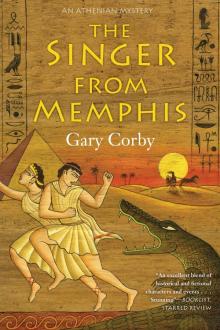 The Singer from Memphis
The Singer from Memphis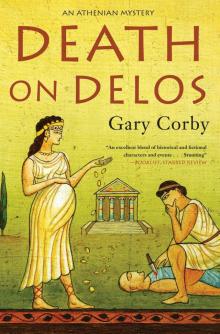 Death on Delos
Death on Delos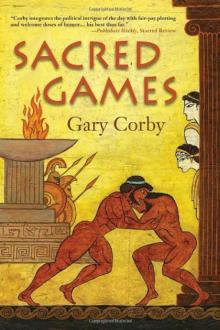 Sacred Games
Sacred Games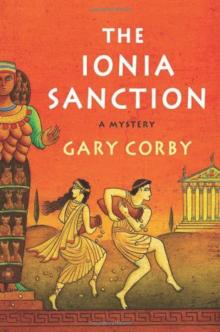 The Ionia Sanction
The Ionia Sanction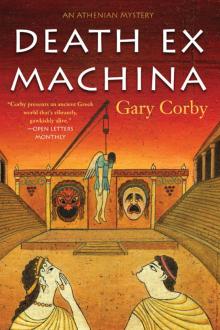 Death Ex Machina
Death Ex Machina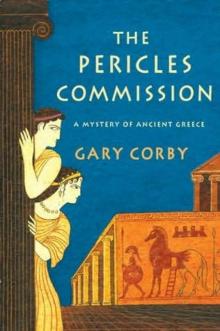 The Pericles Commission
The Pericles Commission